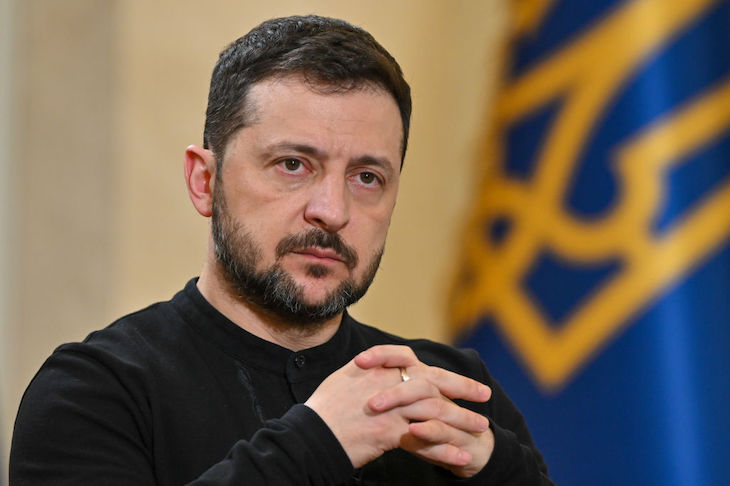For six years in office, Volodymyr Zelensky never experienced the raging crowd beneath his window. But Ukraine’s wartime president grew too powerful, too confident, bathing in the unwavering support of Ukrainians in the face of a greater evil. He overstepped. When Zelensky signed the bill stripping the anti-corruption institutions of their independence, he assumed Ukrainians would look the other way. They didn’t. Protests against the law swept through the country. He did well to listen – and back down. But the damage to his image in Ukraine – and abroad – may now be beyond repair.
The damage to Zelensky’s image in Ukraine – and abroad – may now be beyond repair
On the third day since thousands took to the streets – after a cardboard sign declaring ‘My father didn’t die for this’ was held aloft in front of him – Zelensky finally introduced a counter-law intended to cancel the scandalous one that had destroyed the independence of Ukraine’s key anti-corruption bodies.
Ukrainian lawmakers will return from their outrageous four-week holiday to vote on it in parliament. ‘It is important that we maintain unity’, Zelensky said. ‘It is important that we respect the position of all Ukrainians’. The tape will rewind one week, and Ukraine’s anti-corruption agency, Nabu, and the office of the anti-corruption prosecutor, Sapo, will continue investigating politicians regardless of their status. But questions will linger. What was it all for? What was the reason for this political suicide?
There is no evidence of Zelensky’s personal involvement in corruption, but the same cannot be said for those who share his office. In parliament alone, at least 17 MPs who voted for the scandalous bill have been suspected of corruption by Nabu. But most importantly, the bureau cast its eye over appointees linked to Zelensky’s right-hand man, Andriy Yermak: Pavlo Kyrylenko, the current head of the Anti-monopoly Committee, suspected of illegally enriching himself by nearly £1 million, and Oleksiy Chernyshov, deputy prime minister, allegedly involved in a corruption scheme that cost the state more than £17 million. Both deny the claims.
According to Holos MP Yaroslav Zheleznyak, Yermak was the mastermind behind the bill. Zelensky was persuaded that Nabu’s digging into people around him had gotten out of control, harming his ratings. He thought that Ukraine’s allies would swallow it without protest. In less than a day, the bill passed the Verkhovna Rada to the cheers, laughter and applause of 263 MPs, some of whom were under investigation by the very institutions they had just voted to destroy. By evening, nothing could stop Zelensky from signing it: not the pleas from the Ukrainian public gathered in front of his office in Kyiv, nor the appeals from G7 ambassadors, nor phone calls from French president Emmanuel Macron and Antonio Costa, European Council president. The pace was unprecedented for a president known to let dozens of draft laws gather dust on his desk for months.
Appalled Ukrainians, including Zelensky’s most avid supporters, saw this move as a blatant attempt by the government to steal and avoid accountability. They saw their blood-earned chance to join the EU snatched from under their noses by the very man they had stood behind for over three years of full-scale war. They watched as European and American allies began to question their continued financial support for Ukraine. The unwritten agreement – to set politics aside and focus on the common enemy, Russia – was broken. Zelensky, who still enjoyed 67 per cent public trust according to a recent Rating Group poll, was the one to crack it. His feat of staying in Kyiv and rallying the world behind Ukraine’s cause when Russia invaded has now been stained. Even when this shameful law is scrapped, that stain will be impossible to wash off.







Comments